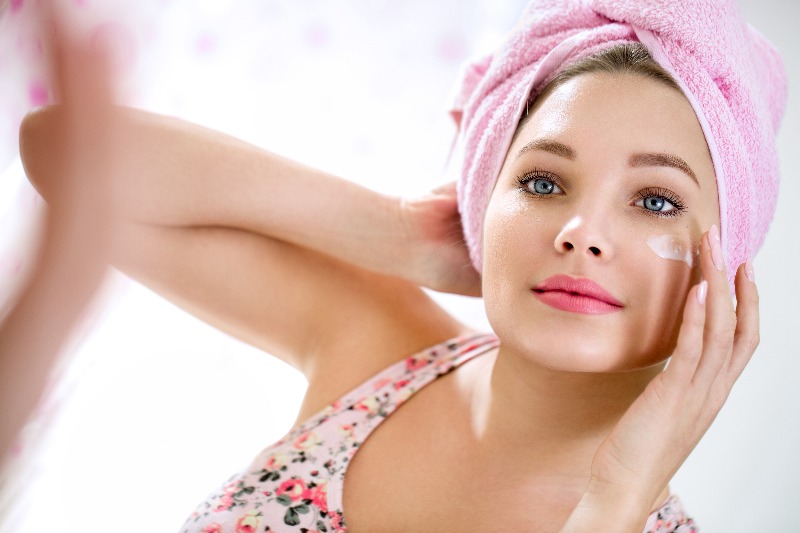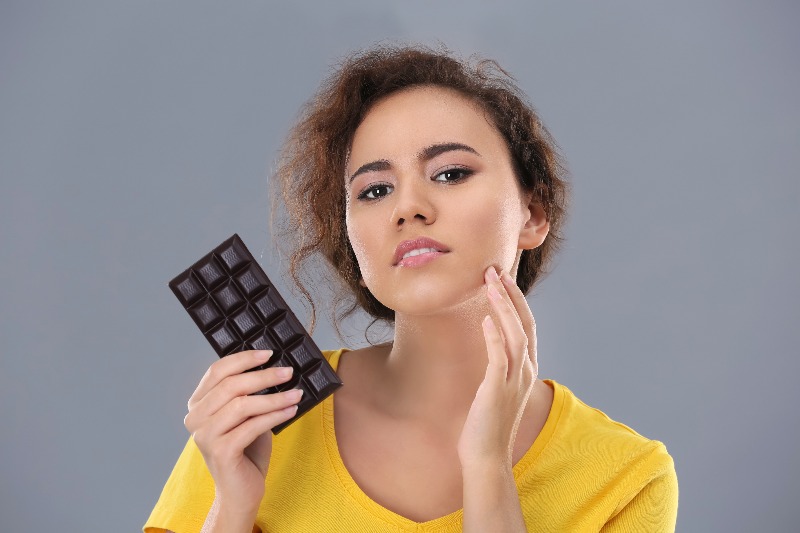Acne is a condition that causes bumps on or underneath the skin. It usually affects teenagers and adults during midlife hormonal changes. Acne can be inflammatory or non-inflammatory, mild or severe, and may leave permanent scars.
There is no cure for this skin condition, but many skincare products and cosmetic treatments effectively alleviate it. To choose adequate treatment, you need to know what causes acne.

What Causes Acne?
Acne develops when dead skin cells and sebum (oil produced by glands in hair follicles) mix and clog the follicle (pore). This happens when the oil glands secrete excess sebum, usually due to hormonal changes in puberty, before menstruation, or in menopause.
If no bacteria are present in the pore, the acne is non-inflammatory (whiteheads and blackheads). If acne-causing bacteria that live on the skin enter the clogged pore, it causes inflammatory acne (papule, pustule, nodule, or cyst).
Note: Inflammatory acne is one of many forms of skin inflammation. Learn how to recognize and treat it effectively.
Acne affects most people, usually during their teenage years. Treating teenage acne can reduce the issues that may occur later. Some types of acne are severe and take a long time to heal and may create scars. We suggest learning about different types of acne scars and how to choose the best treatment for acne scars.
Clinical research shows that genetic factors are important contributors to acne formation. If your parents had pimples, you'll likely have them as well. However, other things may cause acne.
Things That Can Trigger or Worsen Acne
Medications, hormonal changes, diet, stress, and inappropriate cosmetics are potential risk factors for acne development.
Medication
Medications that may trigger acne are:
- Corticosteroids
- Anabolic steroids
- Birth control pills
- Thyroid hormones
- Antibiotics tetracycline and streptomycin
- Halogens
- Lithium
- Some anticancer drugs
These drugs may cause a sudden breakout of papules and pustules. Once you stop using them, the lesions should clear.
Hormonal Changes
Hormonal changes are the most common cause of acne. This includes the hormonal changes in puberty, changes in estrogen and progesterone levels during menstruation, and decreasing estrogen levels in menopause. These changes cause oil glands to produce excessive amounts of sebum.
Note: Check out our comprehensive guide about hormonal imbalance acne.
Diet
There is no clear scientific proof that any foods cause acne, though studies indicate a high-glycemic diet may aggravate the condition. High-glycemic foods may cause insulin resistance, potentially leading to excess sebum production and acne. Patients with breakouts may benefit from a low-glycemic diet that includes fruits and vegetables, healthy fats, and lean protein.
Stress
Stress doesn’t cause acne but may worsen the condition and prolong acne healing.
Inappropriate Cosmetics
Certain cosmetics contain comedogenic ingredients which may clog pores and cause non-inflammatory acne. There are over 100 comedogenic ingredients, including many types of oil (almond, avocado, coconut, corn, cottonseed, peanut, soy, and sesame). If you are prone to acne, it’s best to avoid oil-based cosmetics and look for skincare products with a "non-comedogenic" label.
Foods That Cause Acne: Truths and Myths
Though the link between diet and acne isn’t clear, studies show that some food types may exacerbate this skin condition.
There are many false claims about foods that cause acne. Let's demystify these claims and see which foods may trigger breakouts.

Chocolate
There is no scientific proof that chocolate triggers acne. However, anecdotal evidence suggests that many people develop acne a few days after eating chocolate. Scientists believe that milk chocolate has more comedogenic effects than dark chocolate because it contains more sugar and fewer antioxidants.
Fast Food
Foods high in saturated fat have a high glycemic index. They quickly raise insulin levels, disrupt hormonal activity, and increase sebum production. Avoid fast foods like burgers, pizza, and milkshakes if you are prone to acne.
Omega-6 Fats
Some studies show that Omega-6 fatty acids may cause inflammation and inflammatory acne. Foods that contain the highest amounts of Omega-6 fatty acids are sunflower oil, meat, poultry, eggs, nuts, and seeds. Limit your daily intake of Omega-6 rich foods.
Dairy
Numerous studies suggest acne can be caused and/or aggravated by regular dairy consumption. Dairy cows are treated with artificial hormones including growth hormone to increase their milk supply, and these hormones may alter your natural hormone production and possibly trigger outbreaks. Milk consumption also increases insulin levels stimulating a higher production of sebum, causing outbreaks.
Sugar
Sugar is a refined carbohydrate. It raises insulin levels and potentially increases sebum production. Several studies and surveys indicate a strong link between sugary foods and incidences of acne. A low-sugar diet may lead to fewer breakouts.
Refined Grains/Carbohydrates
Refined carbohydrate foods have a high glycemic index and cause an insulin spike that may trigger acne formation. These foods include:
- Cereals
- Chips
- White pasta
- White rice
- White bread
- Sugary snacks
- Sodas
Whey Protein
Limited research shows whey protein may have a role in acne formation because it may raise insulin levels. More research is needed.
Coffee
No research indicates that coffee causes acne, but it may worsen the condition indirectly. The caffeine in coffee may increase levels of the stress hormone, cortisol. Stress may aggravate acne, so some people experience breakouts after drinking coffee. It is also best to avoid adding milk and sugar to your coffee, and to limit daily coffee consumption.
Eggs
There is no evidence that consuming eggs causes or aggravates acne. If you notice breakouts after eating eggs, it may be a reaction to hormones found in non-organic eggs.
Peanut Butter
There is no evidence that peanut butter or peanuts cause or worsen acne. However, if you consume large amounts of a peanut butter containing a high percentage of additional inflammatory ingredients, such as sugar and trans fats, you may experience breakouts.
Alcohol
Alcohol hasn’t been directly linked to acne formation, but excessive alcohol consumption disrupts hormonal balance and may increase sebum production, causing acne.
Sodas
Soft drinks and beverages with a high sugar content increase insulin levels causing hormonal fluctuations that may increase sebum production. Though the evidence is inconclusive, studies suggest that frequent soda consumption may lead to moderate and severe acne.
Gluten
There is no evidence that gluten causes or worsens acne. While a gluten-free diet may help with some other health issues, it doesn’t alleviate breakouts.
Conclusion
The main factors that cause acne, hormonal changes and genetic factors, make understanding the exact cause for acne challenging. Eliminating certain foods, medications and cosmetics may help speed up acne healing and reduce future breakouts.


